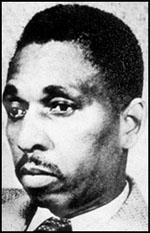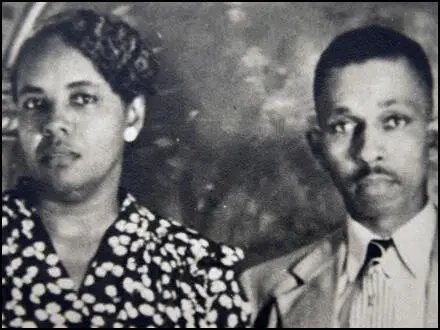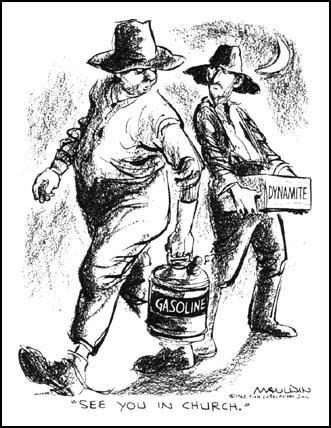Harry T. Moore

Harry Moore was born in Houston, Florida, on 18th November, 1905. After the death of his father in 1914 Moore was sent to live with his mother's sister in Daytona Beach. The following year he moved to Jacksonville where he lived with another of his aunts, Jessie Tyson.
In 1919 Moore began his studies at the Florida Memorial College. After graduating he became a schoolteacher in Cocoa, Florida. He later became principal of Titusville Colored School in Brevard County.
Moore established the Brevard County branch of the National Association for the Advancement of Coloured People (NAACP) in 1934. With the support of the NAACP attorney, Thurgood Marshall, Moore led the campaign to obtain equal pay for African Americans working in Florida's schools. Moore also began organizing protests against lynching in Florida.
In 1944 he formed the Florida Progressive Voters League which succeeded in tripling the enrollment of registered black voters. By the end of the Second World War over 116,000 black voters were registered in the Florida Democratic Party. This represented 31 per cent of all eligible black voters in the state, a figure that was 51 per cent higher than any other southern state. Stetson Kennedy commented: "Moore was a two-fisted saintly fighter for democracy, who throughout his life was in the forefront of the struggle of his people for a greater measure of justice."

Moore's successful campaigns had made him unpopular with powerful political figures in Florida and in June 1946 he was dismissed from his teaching job. The National Association for the Advancement of Coloured People responded by appointing Moore as its organizer in Florida. Moore was a great success in this role and by 1948 the NAACP had over 10,000 members in Florida.
In 1949 Moore organized the campaign against the wrongful conviction of three African Americans, Walter Irvin, Sammy Shepherd, and 16-year-old Charles Greenlee, for the rape of a white woman in Groveland, Florida. Two years later, the Supreme Court ordered a new trial. On 6th November, 1951, while Sheriff Willis McCall was driving two of the defendants, Walter Irvin and Sammy Shepherd, back to Lake County for a pre-trial hearing, he shot them, killing Shepherd and critically wounding Irvin. McCall claimed that the handcuffed prisoners had attacked him while trying to escape. Irvin claimed that McCall had simply yanked them out of his car and started firing. The shooting created a national scandal. Harry Moore began calling for McCall's suspension and indictment for murder.
A month later, on 25th December, 1951, a bomb exploded in Moore's house killing him and his wife. Their friend, Stetson Kennedy, later wrote: "Moore was killed instantly. His wife died after a week of suffering. Even though Mrs. Moore said she had a "good idea" who planted the bomb, neither the local police nor Governor Warren's special investigator Elliott nor the F.B.I. bothered to take any statement from her before she died." Although members of the Ku Klux Klan were suspected of the crime, the people responsible were never brought to trial.

Primary Sources
(1) The Legacy of Harry T. Moore (2001)
In July 1949, the Groveland rape burst upon the national scene, after four young black men were accused of raping a white woman. A white mob went on a rampage through Groveland's black neighborhood, and the National Guard had to be called out to restore order.
Once again, Moore threw himself into the case. After uncovering evidence that the Groveland defendants had been brutally beaten, Moore leveled those charges against the most notorious lawman in the country: Sheriff Willis McCall of Lake County.
Groveland defendants Walter Irvin, Sammy Shepherd, and 16-year-old Charles Greenlee were convicted in 1949, and Irvin and Shepherd were sentenced to death. In April 1951, however, Irvin and Shepherd's convictions were overturned by the U.S. Supreme Court; Lake County immediately prepared to try them again. On November 6, 1951, while Sheriff McCall was driving two of the defendants, Walter Irvin and Sammy Shepherd, back to Lake County for a pre-trial hearing, he shot them, killing Shepherd and critically wounding Irvin. McCall claimed that the handcuffed prisoners had attacked him while trying to escape. Irvin claimed that McCall had simply yanked them out of his car and started firing. The shooting created a national scandal. Harry Moore began calling for McCall's suspension and indictment for murder.
(2) In his book, I Rode With the Klan (1954), Stetson Kennedy wrote about the murder of his friend, Harry T. Moore, on 25th December, 1951.
Terrorists planted a bomb under the bedroom of Mr. and Mrs. Harry T. Moore, Negro residents of Mims, a small town north of Miami. Moore was killed instantly. His wife died after a week of suffering. Even though Mrs. Moore said she had a "good idea" who planted the bomb, neither the local police nor Governor Warren's special investigator Elliott nor the F.B.I. bothered to take any statement from her before she died.
Moore was a two-fisted saintly fighter for democracy, who throughout his life was in the forefront of the struggle of his people for a greater measure of justice. at the time of his death he was not only state secretary of the N.A.A.C.P. but also leader of the Progressive Voters League of Florida.

